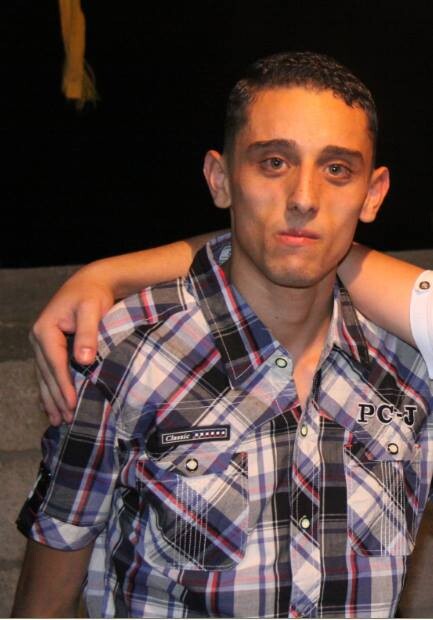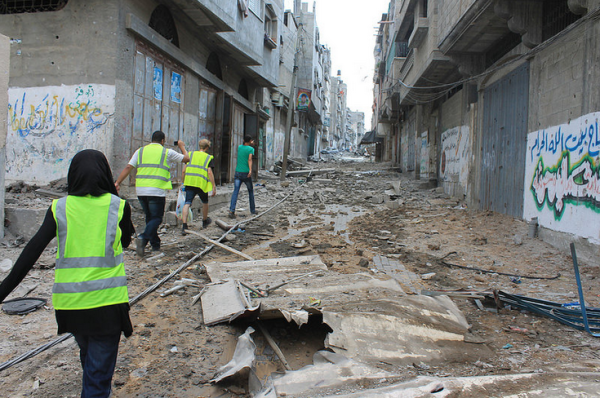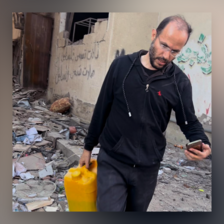The Electronic Intifada 20 July 2016

Salem Shamaly (photo courtesy of the Shamaly family)
Two years ago, during Israel’s 2014 onslaught against Gaza, a young, unarmed man was killed by Israeli snipers. The killing was recorded and uploaded to YouTube and the video went viral.
The young man was Salem Shamaly. Salem, 23, was helping medics and volunteers search for injured people, including what he thought might be his own family members, trapped in the rubble of their houses after an early morning bombardment by the Israeli military of the Shujaiya neighborhood of Gaza City.
Even amid the death and destruction of the 2014 onslaught, Salem’s story stood out, garnering international headlines and raising questions about war crimes. But two years later, justice has not been done for Salem — or indeed any of the 2,251 Palestinians, including 551 children, Israel killed in Gaza, according to the UN’s independent commission of inquiry.
To his family, Salem was a person with great potential who was plucked in his prime by a brutal occupier that refuses to let Palestinians be. The death of the family’s oldest son has also precipitated decline. Salem’s father, Khalil, 61, has seen his small business — selling baby sanitary products — falter, and his asthma and heart conditions worsen. The family home was partially damaged during the assault and Khalil lost all his inventory, at an estimated value of some $30,000, almost all his life savings.
A loved boy
Salem — his name meaning safe and sound in Arabic — was born in the densely populated Shujaiya neighborhood in 1992, during the waning years of the first Palestinian intifada. He was a calm baby born on a turbulent day, his parents remember, and only cried a little. And as the first boy after six daughters and 13 years of marriage, his was a special celebration. He would always be the oldest son, even when he eventually was just one of 12 siblings, and his father would finally be Abu Salem and have a son to take over his shop and carry on the family name.
“I always used his pet name, Salouma, until he was 22. He was the apple of my eye; he was obedient. God bless his soul; he was caring and respectful,” his mother Amina, 45, said.
And like many mothers, Amina would dote on her son.
She talked of his love of football and food, his favorite dish, maqlouba, and his demeanor, painting a picture of a caring and considerate child who would always ask his mother if she wanted anything before he would leave the house.
“He is loved by everyone. I was even afraid too much love would spoil him,” said Umm Salem, still referring to her son in the present tense.
His father too, gave Salem special treatment. Not long after the boy could do basic maths and talk to customers, Khalil would have him help out in the shop during holidays and after school.
When Salem finished high school, he joined a local college to study accounting so that he could help with his father’s business.
But when Salem’s younger brother finished high school a year later and wanted to go to college, Salem decided to put his studies on hold and give his brother a chance to study at college and help him with the fees.
At the age of 22, Salem had finished one year of a two-year college program and started his own business, selling children’s clothing.
In one year, the young man managed to double his savings from $2,000 to $4,000. In an economy like Gaza’s, that has to constitute success. He was determined, said his mother, to start his own family and had even identified the woman he wanted to marry.
The name he only confided to his mother. And to this day, Umm Salem has not told anyone who she was.
She would never see her son married.
“Israel deprived us of Salem. And they deprived us of the children Salem would have had. And it breaks my heart,” Amina said.
A fateful day
Most of Salem’s extended family lives in Shujaiya. During Israel’s assault on Gaza, the neighborhood, on the eastern part of Gaza City, was targeted with a ferocity that alarmed even US officials. John Kerry, the secretary of state, in an unguarded moment sarcastically called it a “hell of a pinpoint operation.” What became known as the Shujaiya massacre, on 20 July 2014, left more than 100 dead, more hundreds injured and damaged or destroyed more than 1,800 homes and buildings.
Along with the nearly 100,000 Palestinians in the area — one of the most densely populated parts of Gaza Strip, itself of one of the most densely populated areas in the world — the Shamaly family was warned to evacuate their homes ahead of an impending assault. But some residents were stuck in their houses or went missing when the Israeli military began a ground invasion on the night of 19 July.
Initial Palestinian resistance to that invasion resulted in the killing of 12 Israeli soldiers. That, in turn, elicited a wild response. For more than six hours, from the early hours of 20 July and into the late morning, the Israeli military threw everything at the neighborhood, pummeling Shujaiya with artillery, mortars and rockets fired from the air.
Most casualties came during that shelling. But the killings didn’t end there.
At around 1:30 in the afternoon, the Israeli army announced a two-hour “humanitarian ceasefire.” Salem joined a group of medics and activists heading towards Shujaiya to look for his missing relatives and other injured people.

Salem Shamaly, in green shirt, leading a group of volunteers in Shujaiya shortly before he was shot repeatedly by Israeli snipers on 20 July 2014.
In the video of the incident, Salem can be seen helping carrying out wounded people and calling for members of his family. Then suddenly, as the volunteer who is filming is himself running over rubble, a shot rings out.
After a brief moment of confusion, during which Salem can be heard trying to make sense of the situation, another shot. In the next frame, a still alive Salem is lying down, clearly wounded. Then another shot. Then another.
According to Joe Catron, an American activist and journalist who witnessed Salem’s slaying, “it should have been fairly obvious [to the snipers] that Salem was carrying nothing at all.”
“The first shot missed everyone, but split our group into two. Then as Salem tried to lead his group back across the alley, three more shots struck and killed him,” Catron told The Electronic Intifada.
“It was a ceasefire. And Salem was helping medics recover injured relatives,” Sameer Abu Aser, Salem’s brother-in-law, told The Electronic Intifada.
Israel prevented the Red Cross from recovering the injured or the bodies of the dead, Abu Aser recounted. And for two days, Salem was missing. At that point, no one in the family knew it was Salem in the video that had by then been posted and gone viral.
His family checked with their relatives. They checked Gaza’s al-Shifa hospital.
“We had to look into the faces of hundreds of people Israel had killed and injured looking for Salem. He was nowhere to be seen,” Abu Aser said.
Justice over revenge
Abu Aser was the first to recognize Salem in the video. The toughest thing, he said, was telling his parents. They tried to venture back to Shujaiya to bring Salem back. But their relatives did not allow them. Going back was certain death.
Only after six days of waiting and hoping that Salem had managed somehow to stay alive, did they manage to retrieve his partly decomposed body.
Salem was not very political, his family say. He was always absorbed in family issues or running errands for relatives. Salem’s only problem, his mother said, was that he wanted to help people.
A burning sense of injustice has taken a hold of Salem’s father, Khalil. No war crimes investigation has been held into his son’s death, even though the UN called his slaying an act of “willful killing.”
The circumstances around his slaying, the UN’s commission of inquiry concluded, “indicate that a civilian was targeted in violation of the principle of distinction. The fact that [Salem] was shot twice while lying injured on the ground is indicative of an intent to kill a protected person (either owing to his civilian status or to the fact that he was hors de combat) and constitutes an act of willful killing.”
Not long after the family had retrieved Salem’s body, Khalil remembered, he was asked by a western journalist what he wanted: “Revenge, I said at the time.”
Khalil paused.
“But now I am seeking justice for the blood of my son. I am seeking justice for the pain and suffering we’ve been through.”
Khalil began counting off on his fingers.
“Israel committed many crimes, not one: they killed Salem during a ceasefire. He was unarmed and helping others. They shot him, and then shot him again when he was helpless on the ground. Soldiers did not allow medics to take him to hospital, he was left to bleed and his body was left out in the open for stray dogs and rodents to feast on.”
The angry and bereaved father stopped.
“I want international organizations to sue Israel and bring the murderers to court.”
Refaat Alareer is the editor of Gaza Writes Back: Short Stories from Young Writers in Gaza, Palestine.





